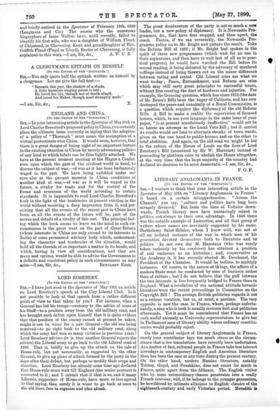LORD ROSEBERY.
[TO THE EDITOR OF THE "SPECTATOR.")
SES.,—I have just read in the Spectator of May 13th an article on Lord Rosebery's speech at the City Liberal Club. Is it not possible to look at that speech from a rather different point of view to that taken by you 1 For instance, when a General has led his troops—contrary to the advice of some of his Staff—to a position away from the old military road, and has brought such defeat upon himself that it is quite evident that that position of the enemy cannot at present be taken, might it not be wiser for a new General—the old one being removed—to go right back to the old military road, along which the army had won so many victories in previous years? Lord Rosebery advises (it is true another General rejects the advice) the Liberal army to go back to the old Liberal road of 1886. That is, boldly to give up the attack on the side of Home-rule, but not necessarily, as suggested by the other General, to give up plans of attack formed by the party in the days after their defeat, but perhaps to modify their scope and direction. Lord Rosebery has already some time ago declared that Home-rule must wait till England (the senior partner) is converted to it; and I submit that if that is so, and if many Liberals, supporters of Home-rule, have more or less agreed to that saying, then surely it is wiser to go back at once to the old lines, free to organise and plan afresh. The great desideratum of the party is not so lunch a new leader, but a new policy of diplomacy. It is Newcastle Pro-, grammes, dm., that have first stopped, and then upset, the coach. Fasten, if we can reverently, the Newcastle Pro- gramme policy on to Mr. Bright and picture the result. Take the Reform Bill of 1866; if Mr. Bright had spoken in the spirit of these new programmes (which wait for no one in their aspirations, and then have to wait last of all as to prac- tical progress), he would have wrecked the Bill before its second reading, it being defeated by the advocacy of manhood suffrage instead of being thrown out on the minor difference between rating and rental. Old Liberal cries are what we want to-day ; Peace, Retrenchment, and Reform are cries which may still carry great principles to successful issues, without first creating the dust of hardness and injustice. For example, the licensing question, which has since 1872 (the date of Mr. Bruce's Bill) been the bogey of Cabinets, and has now destroyed the peace and unanimity of a Royal Commission, is a question which requires the diplomacy of the old Reform Bills. A Bill to make a reality the supervision of licensed houses, which, to use your language in the same issue of your paper, "is at present scandalously ineffective," would not be so heroic an attempt as the Local Veto Bill ; but if carried its results would not lead to alternate streaks of town wards, given on the one hand to public-houses, and on the other to total abolition. And again, on the old road we might be led to the reform of the House of Lords on the lines of Lord Rosebery's Bill (unnoticed by Sir W. Harcourt) instead of proceeding by platform cries to abolish the House altogether, at the very time that the large majority of the country had declared its decision to be most democratic.—I am, Sir, dre., F. G. P.






































 Previous page
Previous page